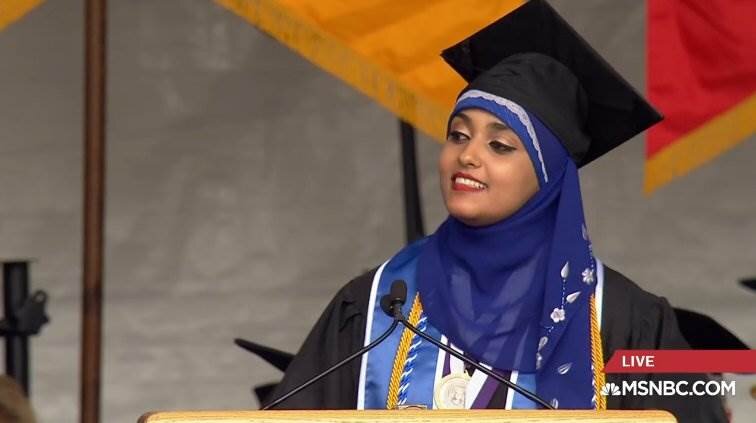 City College discussion focuses on Muslim women and their head coverings By Krystal Rivera“If you look at his wife, she was standing there, she had nothing to say, she probably — maybe she wasn’t allowed to have anything to say.”That is what presidential candidate Donald Trump said this summer, insulting the Muslim wife of Khizr Khan, a Pakistani American lawyer whose son died fighting in Iraq. Ghazala, who wore a hijab to cover her head, stood beside her husband as he made a speech urging people to vote for Hillary Clinton.Like Trump, many people are quick to make cultural assumptions about women who cover their heads with headscarves and veils. Marnia Lazreg, an author and professor of sociology at Hunter College, questioned the misconception that wearing a veil makes women less powerful. She spoke recently at the “Human Rights Forum 4th Annual kickoff event: "Women and the Veil” in CCNY’s Great Hall.Lazreg questioned why the veil had become a topic of discussion and debate during this time and her answer was simple. “Normalization," she stated. “Normalization is a powerful process. It cuts the veil off its general history and thus makes it palpable."Depending on the global, political and cultural context, the meaning will change, she added. Given the context in which the discussions take place, and interpretations surrounding, a woman may never feel as if she’s entirely free if her decision is to wear a veil. Much controversy, confusion and fear surrounds Muslims and the Islam religion, which sparks stereotypical remarks such as Trump’s.A student from CCNY, who attended the event, wearing a veil herself, took the microphone in confusion. “Does not wearing a veil equal freedom?” she asked. Lazreg explained that wearing and not wearing the veil shouldn’t equate freedom, and emphasized that covering the head can sometimes become problematic. “[For instance,] when a woman justifies the veil as the only sign of being a Muslim,” she suggested, explaining that assuming the veil is the whole tradition shouldn’t be the case. “One can be a very good Muslim and not wear a veil.”Lazreg, the author of the book, “Questioning the Veil: Open Letters to Muslim Women,” stressed the importance of being open-minded. "If we look at the history of the veil it was not all peachy,” the author explained. “It came with, whether we like it or not, a very definite, political, social and economic inequality.To learn more about this topic, visit the exhibit "Unveiling the Veil" on the first floor in Shepard Hall.
City College discussion focuses on Muslim women and their head coverings By Krystal Rivera“If you look at his wife, she was standing there, she had nothing to say, she probably — maybe she wasn’t allowed to have anything to say.”That is what presidential candidate Donald Trump said this summer, insulting the Muslim wife of Khizr Khan, a Pakistani American lawyer whose son died fighting in Iraq. Ghazala, who wore a hijab to cover her head, stood beside her husband as he made a speech urging people to vote for Hillary Clinton.Like Trump, many people are quick to make cultural assumptions about women who cover their heads with headscarves and veils. Marnia Lazreg, an author and professor of sociology at Hunter College, questioned the misconception that wearing a veil makes women less powerful. She spoke recently at the “Human Rights Forum 4th Annual kickoff event: "Women and the Veil” in CCNY’s Great Hall.Lazreg questioned why the veil had become a topic of discussion and debate during this time and her answer was simple. “Normalization," she stated. “Normalization is a powerful process. It cuts the veil off its general history and thus makes it palpable."Depending on the global, political and cultural context, the meaning will change, she added. Given the context in which the discussions take place, and interpretations surrounding, a woman may never feel as if she’s entirely free if her decision is to wear a veil. Much controversy, confusion and fear surrounds Muslims and the Islam religion, which sparks stereotypical remarks such as Trump’s.A student from CCNY, who attended the event, wearing a veil herself, took the microphone in confusion. “Does not wearing a veil equal freedom?” she asked. Lazreg explained that wearing and not wearing the veil shouldn’t equate freedom, and emphasized that covering the head can sometimes become problematic. “[For instance,] when a woman justifies the veil as the only sign of being a Muslim,” she suggested, explaining that assuming the veil is the whole tradition shouldn’t be the case. “One can be a very good Muslim and not wear a veil.”Lazreg, the author of the book, “Questioning the Veil: Open Letters to Muslim Women,” stressed the importance of being open-minded. "If we look at the history of the veil it was not all peachy,” the author explained. “It came with, whether we like it or not, a very definite, political, social and economic inequality.To learn more about this topic, visit the exhibit "Unveiling the Veil" on the first floor in Shepard Hall.
Welcome to The Campus!
We’re glad you’re here. Look through our articles to find something that interests you. If you’re interested in writing, editing, photographing, drawing, designing, or social media managing for us, contact us at thecampus@gtest.ccny.cuny.edu or come to a meeting in NAC 1/119 during club hours.

